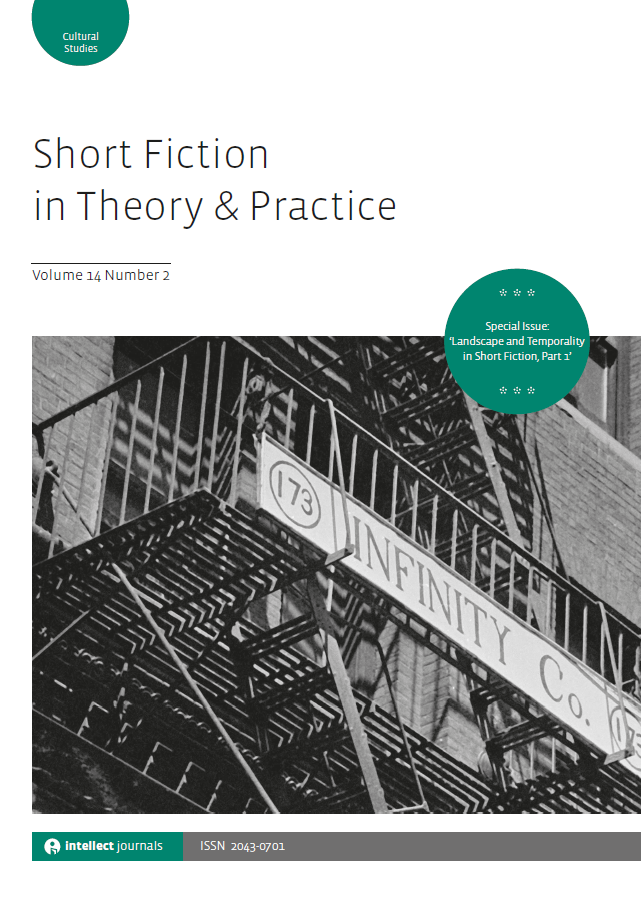
Short Fiction in Theory and Practice 14.2 is out now! Special Issue
Intellect is pleased to present Short Fiction in Theory & Practice 14.2!
Special Issue: ‘Landscape and Temporality in Short Fiction, Part 1’
The European Network of Short Fiction Research’s 2023 Annual Conference held at the University of Manchester focused on the themes of landscape and temporality in the short story and the short story cycle. In writing the call for papers, we were curious to see how scholars, writers and researchers were updating Bakhtin’s concept of the Chronotope in relation to the conference’s themes. Bakhtin defined the Chronotope as ‘time space’ which allows literary critics to analyse how the ‘intrinsic connectedness of temporal and spatial relationships’ is ‘artistically represented in literature’ (1982: 80). We were pleasantly surprised by the overwhelming response our call for papers generated from scholars across the globe. This Special Issue of Short Fiction in Theory and Practice – as well as another Special Issue of the journal coming out in 2025, alongside a Special Issue of the Journal of Short Story in English – will showcase the range and breadth of these responses.
For more information about the journal and issue click here>>
https://www.intellectbooks.com/short-fiction-in-theory-practice
Aims & Scope
Short Fiction in Theory & Practice provides an international forum for all those writing, reading, translating or publishing the short story, in all its diversity – including flash fiction, the novella, cycles, sequences, anthologies and single-author collections; hypertext, popular fiction (e.g. science fiction, horror), the prose poem, the non-fiction story and other hybrid genres. It looks at the short story from the practitioner’s viewpoint; we are concerned with the ongoing process and philosophy of composition rather than the ‘postevent’ dissection of literary texts.
This title is indexed with Scopus.
Issue 14.2
Editorial
Landscape and temporality in short fiction: Expanding Bakhtin’s Chronotope through critical and creative responses
PAUL ANTHONY KNOWLES, MADELEINE SINCLAIR AND ANA GARCÍA-SORIANO
Articles
‘People Who Want History Want History’: Experimenting with temporal, environmental and narrative dislocation in short fiction about dementia
NAOMI KRÜGER
‘The new south coast’: Compassion in extreme landscapes in Michel Faber’s short fiction
RODGE GLASS
Dioramic landscapes and the multi-temporality of places: The phantasmagorical writing of Pompeii in Théophile Gautier’s ‘Arria Marcella’ (1852) and ‘Jettatura’ (1856)
COLLINE CHARLI
‘The notes of an informed Edwardian travel writer’: Tourist landscapes in M. R. James’s ghost stories
SUZANNNE BRAY
We do not know what we are doing: Notes from a keynote lecture
JON MCGREGOR
Writers as curators and disruptors: How placement of domestic articles in short fiction depicts and explores notions of temporality
SARAH SCHOFIELD
‘But not for him. Just by him’: Hungarian landscapes and women’s time in the short fiction of Anna T. Szabó and Krisztina Tóth
URSULA HURLEY AND SZILVI NARAY
‘Things happen when Eskimos go south!’: Inuit/unique encounters between north and south, city and tundra, the dead and the living in Norma Dunning’s Tainna: The Unseen Ones
CORINNE BIGOT
Book Reviews
Dublin Tales, Paul Delaney and Eve Patten (eds) (2024)
ELKE D’HOKER
The Short Story after Apartheid: Thinking with Form in South African Literature, Graham K. Riach (2023)
MARTA FOSSATI
Openings, Lucy Caldwell (2024)
PAUL ANTHONY KNOWLES AND SAMANTHA CASSELLS
Interview
The space between the stories: An interview with Thomas Morris
ANA GARCÍA-SORIANO AND MADELEINE SINCLAIR

